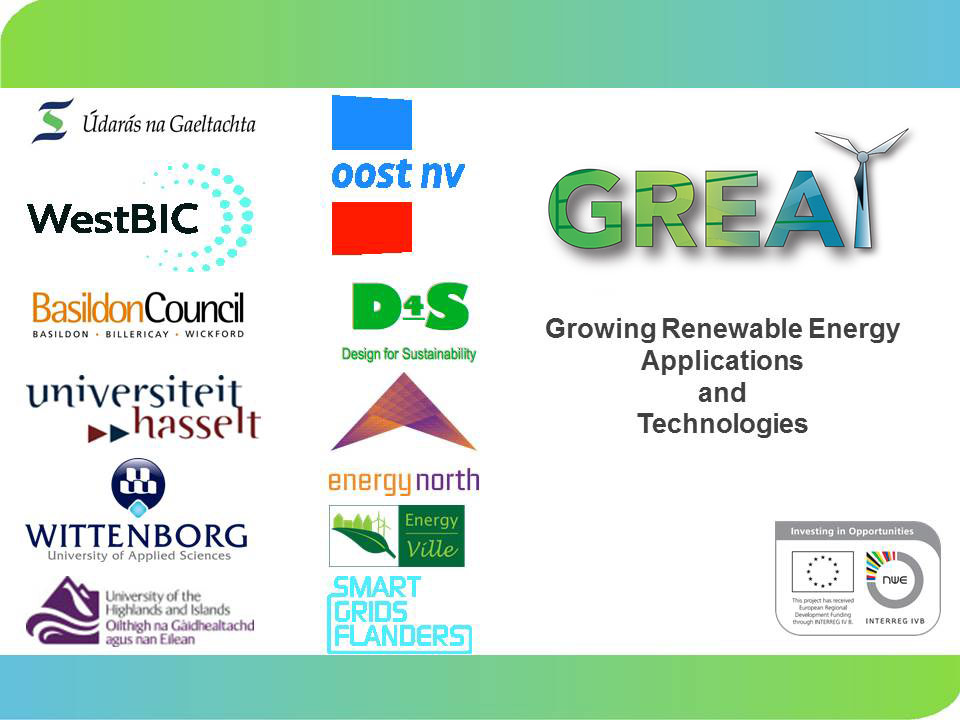The GREAT Project, a substantial research project in Growing Renewable Energy Applications and Technologies
Creating a “Research Environment” at a small University of Applied Sciences is seen as a major element of its research strategy, and it is Wittenborg’s aim to develop a research environment that involves the interaction of staff and students within the institute and associated to the institute with regard to research within the Bachelor and Master curriculum and more extensive research outside and within partnerships between national and international academic and research institutions.

According to Director Maggie Feng, who is leading the research centre team for the GREAT Project, “Wittenborg believes that its research projects should have a direct impact on the regional economy that our University belongs to, for instance, the Municipality of Apeldoorn, the Province of Gelderland, and even the Netherlands as a whole. The GREAT project provides Wittenborg the opportunity to contribute to development of sustainable policy and implementation of renewable energy application in the region, specifically working with small to medium sized enterprises (SMEs), coupled with the stimulation of investment in human capital, essential for the regional and national economy.”
Developing a Research Strategy
In February 2011, Dr Teun Wolters, as Wittenborg’s first appointed research professor (lector in Dutch) wrote “It is our vision that WUAS’s development should rest on two pillars: education and research. For the moment all activities emanating from this fall within the ambit of the business school, but this may change in the future”.
Dr Wolters explained that the initial research activities will be in the area of his research and teaching commitment (corporate sustainability including sustainable innovation) while there is also room for various research themes that are supported by Wittenborg’s stakeholders and other interested parties. The research centre intends to have meaning for the local economy by doing research and consultancy for companies and other organisations in its surroundings.
Since that time, the business plan for the development into 5 schools (Business, Hospitality & Tourism, Arts & Technology, Health & Social Welfare and Education) has been instigated, with a focus on internationalisation, diversity, management and sustainability.
According to Dr. Wolters: “The centre’s research is primarily of an applied nature at the moment, but by means of a careful coordination and pooling of resources it must be possible to generate new knowledge through academic and scientific research that can be published in relevant peer reviewed academic journals in the area of management and business."
By involving lecturers and students in the centre, the research will contribute to the build-up of a valuable body of knowledge. Here, three facets can be distinguished:
- Lecturers can add to the textbook knowledge specialised new knowledge by which they can enhance their teaching and supervision. The research leads to new knowledge in terms of research skills, fieldwork experience (direct contacts with companies) and new substantive knowledge on business and management.
- By coordinating students’ research work, the design and content of their papers can be enhanced. By setting up a coherent research programme, contributions of individual students can contribute to a broader knowledge build-up.
- By facilitating publications (at different academic levels), Wittenborg’s lecturers will be offered opportunities to enhance the quality of their research and teaching work.
The centre will also develop contacts with external researchers and research institutes. In this way, it can operate as a catalyst of interesting collaborative research. Recently, there are nascent forms of collaboration with universities and consultancy firms, that will be worked out in the near future. “
During the past three years, Wittenborg has improved its research capabilities by engaging a substantial number of PhD qualified researchers in the teaching staff, many of whom are carrying out research on various topics, and intends to carry on with this policy.
Wittenborg has forged many contacts and relationships with companies and governments in the region, as well as universities and research institutes internationally which can be partnered with when developing and executing research projects.
The GREAT Project
The GREAT (Growing Renewable Energy Applications and Technologies) project is an EU funded project under the INTERREG IVB NWE Programme. GREAT aims to encourage communities and small to medium size enterprises (SMEs) to develop technological solutions for Smart Grid, Renewable Energy and Distributive Generation; research and develop policy issues for regulatory authorities and provide structured co-operation opportunities between SMEs and research institutes / technology developers. The project encourages cross sector integration involving the following sectors:
· Public authorities supporting economic generation and incorporating the requirements of distributed energy in its new developments
· Economic development agencies linking with Original Equipment Manufacturers (OEMs) and transmission bodies to sculpt opportunities for SMEs and providing business support to them
· Research bodies involving themselves with all parties for two purposes: technology transfer and analyses of regulatory and market situations to provide good practices and policy recommendations
· OEMs and large manufacturers demonstrating the benefits of distributed generation and Smart Grids to enlarge the market and improve their supply chains
· SME suppliers in the market developing their businesses through international contacts and consortia
Accelerate deployment of Smart Grid benefits in North West Europe (NWE). Smart Grid / Renewable Energy / Distributive generation provide opportunities for SMEs to achieve optimum synergies in this emerging sector. The project stimulates enterprises, develops innovations and creates employment; creates practices / policies that will help to push the third industrial revolution forward in NWE.
The project aims to:
a) Inform Regulatory and Policy Actors of the opportunities Smart Grid
b) Enable and promote the sectors as a growth opportunity for SMEs in NWE.
c) Provide a Platform across NWE that promotes and develops Smart Grid benefits; encourage new Smart Grid services and technologies be developed for citizens.
Objectives:
1 Develop set of tools to enable SMEs to engage with SG/DG/RE Nexus
2 Provide tools to SMEs to compete for transnational business
3 Stimulate product developments through developing international consortia
4 Increase awareness of market opportunities through distribution network
WUP 9/7/2014
©WUAS Press
by James Wittenborg
